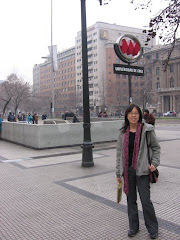En Casa Latina
This Saturday I started volunteering at Casa Latina, a nonprofit community center in south Seattle which serves the Hispanic immigrant population with English classes, a free clinic, and most importantly, a call center for day jobs. The Casa's basic model of empowerment is to provide immigrants with a community that speaks their language (including Hispanic and non-Hispanic volunteers - I've never met so many Americans fluent in Spanish in one place before, outside of Peru), equips them with education or resources, and gives them access to day-labor that will hopefully lead to more work and enough regular clients (ie employers who call them back on a regular basis) that they can support themselves and their families without having to go through the Casa's day worker program anymore.
It's a pretty good idea - using a trustworthy organization to obtain work and advocate for unprotected workers - except that day labor is not exactly recession-proof. This Saturday we only had about 5 phone calls; normally Saturday is the busiest day of the week, with employment for most of the 30-40 workers who come in early every morning to wait for work. According to one of the staff I talked to, the workers themselves are no longer just undocumented recent arrivals, but people who've been here for years, had jobs, and lost them. A lot of them have also migrated north from California after that state's economy took a nosedive. (Washington is doing slightly better.)
I will be working every other Saturday morning as a day work dispatcher. Every Friday, workers go flyer neighborhoods offering services from weeding to painting to building; phone calls come in asking for 2 people to come over to help with an all-day move, or for one worker for a few hours to do some gardening. Once I take down the info, if they've requested a drop-off I reserve the Casa's van to transport the worker to the job, and then I file the job under the correct date so that it can be "dispatched" from whatever pool of workers is there that day. Work is usually granted by raffle unless specific skills are needed.
The worker's waiting area is a little warehouse just over from the office building where we take calls. This Saturday it also featured stations for getting your blood pressure checked (by UW med students), your hair cut (by an enterprising new member of the Casa's women's program), or getting a snack or a 25 cent cup of instant coffee (from a "tienda" that is formally run by the women's program). Even on a slow day with little work, there was at least a spirit of camaraderie, and it feels great to be in a Spanish-speaking environment again. I even met two Peruvians, one of them a half-Chinese guy from Chiclayo who was there as a medical volunteer, not a day worker.
I hope to report more as I get to know the immigrant community here.
SOOO Behind
15 years ago

1 comment:
Very cool, Clara! Sounds like a great organization. I'm sure it's wonderful to be using your Spanish again.
Post a Comment